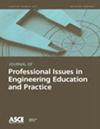工程教育、研究与设计:突破有限空间
Q1 Business, Management and Accounting
Journal of Professional Issues in Engineering Education and Practice
Pub Date : 2017-10-01
DOI:10.1061/(ASCE)EI.1943-5541.0000328
引用次数: 6
摘要
阈限是工程教育工作者、研究人员和设计师熟悉的概念,是一种挑战和不适的状态,我们必须不断进出,以推进我们各自的目标。在熟悉工程4学习者与阈限性讨论的共同领域寻求。门槛概念、发散-收敛思维,以及设计、研究和教育的概念,这些都是与突破有限空间相关的迭代过程。通过习得和参与这7个隐喻来探讨学习的双重性。本文讨论了设计课程在引导学习者进入和走出有限空间中的应用,特别是帝国土木工程孟学位的小组设计项目。最后,从工程和心理学的角度来看,与常规设计过程相反,该研究简要地考察了作者在伦敦帝国理工学院土木与环境工程系担任讲师和研究员的经历背景下的教育、研究和设计。特别是借鉴了指导39名博士生,个别硕士和最后一年孟项目学生的经验,交付一年级和40名二年级结构力学,并在四年制土木工程孟学位的第三年协调41个小组设计项目。42本文章由计算机程序翻译,如有差异,请以英文原文为准。
Engineering education, research and design: breaking in and out of liminal space
1 Liminality is presented as a concept familiar to engineering educators, researchers and 2 designers, as a state of challenge and discomfort that we must flux in and out of in order 3 to advance our respective aims. Common areas for discussion in familiarising engineering 4 learners with liminality are sought. Threshold concepts, divergent-convergent thinking, and 5 the concept of design, research and education as iterative processes associated with breaking 6 in and out of liminal space are explored. The duality of learning is discussed through the 7 acquisition and participation metaphors. The use of design courses in leading learners in 8 to and out of liminal space, and in particular the Group Design Projects on the Imperial 9 Civil Engineering MEng degree are discussed. In closing the informed creative, as opposed 10 to routine design process, viewed from an engineering and a psychology perspective is briefly This study examines education, research and design within the context of the author’s experiences as a lecturer and researcher in the Department of Civil and Environmental Engineering at Imperial College London. In particular drawing on experiences of supervising 39 PhD students, individual MSc and final year MEng project students, delivering first and 40 second year Structural Mechanics, and in coordinating the Group Design Projects in the 41 third year of the four year Civil Engineering MEng degree. 42
求助全文
通过发布文献求助,成功后即可免费获取论文全文。
去求助
来源期刊
CiteScore
3.10
自引率
0.00%
发文量
0
审稿时长
>12 weeks
期刊介绍:
The Journal of Professional Issues in Engineering Education and Practice presents issues of broad professional interest and diverse views of engineering education, and professional practice. Papers examine the relationships between civil engineering and other disciplines and professions, with emphasis on the engineer"s and constructor"s obligations and responsibilities. Topics include engineering education at all levels, professional practice issues, ethics, and history and heritage.

 求助内容:
求助内容: 应助结果提醒方式:
应助结果提醒方式:


